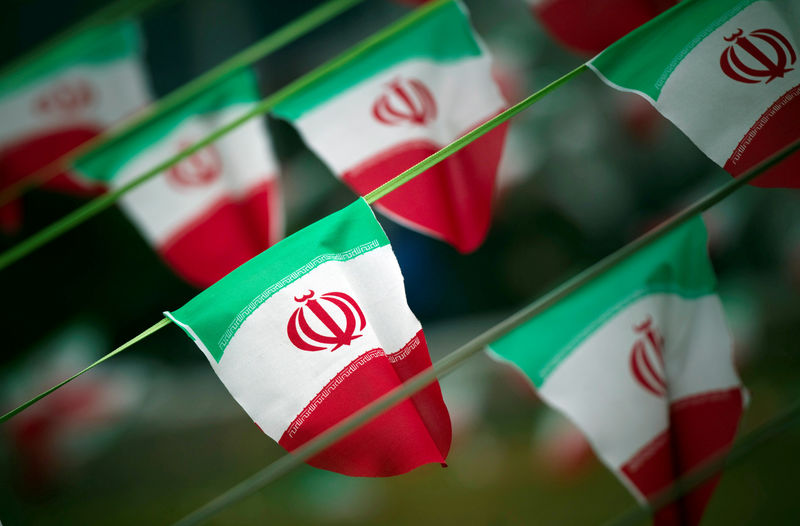By Parisa Hafezi and Jeff Mason
DUBAI/WASHINGTON (Reuters) - U.S. President Donald Trump said on Sunday he was not seeking war with Tehran after a senior Iranian military commander warned any conflict in the Gulf region could spread uncontrollably and threaten the lives of U.S. troops.
Tensions remain high after Trump said on Friday that he called off a military strike to retaliate for Iran's downing of an unmanned U.S. drone because it could have killed 150 people.
"I'm not looking for war," Trump said on NBC's Meet the Press programme.
Trump has said he will impose further sanctions on Iran beginning on Monday, but has also indicated that he would be prepared to seek a deal to bolster its flagging economy, an apparent move to defuse tensions.
"I think they want to negotiate. And I think they want to make a deal. And my deal is nuclear. Look, they're not going to have a nuclear weapon," he added.
"I don't think they like the position they're in. Their economy is, is absolutely broken."
Relations in the region began to worsen significantly when Trump pulled out of a 2015 nuclear deal between Iran and six powers and reimposed sanctions on the country. The sanctions had been lifted under the pact in return for Tehran curbing its nuclear programme.
Iran has said it would respond firmly to any threat against it and warned on Sunday of the risks of a military confrontation.
"If a conflict breaks out in the region, no country would be able to manage its scope and timing," Major General Gholamali Rashid said, according to the semi-official Fars news agency.
"The American government must act responsibly to protect the lives of American troops by avoiding misconduct in the region."
Iranian President Hassan Rouhani accused the Americans of stoking tensions in the Gulf through what Iran has called the violation of its airspace by the U.S. military drone, the semi-official Fars news agency reported.
Washington said the aircraft was targeted in international air space in "an unprovoked attack".
U.S. Vice President Mike Pence, who supported retaliatory action against Iran last week, said Tehran "should not confuse American restraint with American resolve" after Trump's decision to call off the air strikes.
"This President has made it clear we are going to protect American forces in the region, we're going to protect American interests in the region, and the United States of America will never allow Iran to obtain a nuclear weapon," Pence told CBS's Face the Nation programme.
He said Trump would impose sanctions on Iran starting on Monday. "As of tomorrow we expect the President to announce an additional round of sanctions," Pence said.
"HUNTING LICENCE"
Speaking during a visit to Israel, U.S. National Security Adviser John Bolton sought to maintain the military pressure on Iran.
"Neither Iran nor any other hostile actor should mistake U.S. prudence and discretion for weakness. No one has granted them a hunting licence in the Middle East,"
Iran is feeling the effects of the sanctions, Bolton told reporters, adding Iran would never be allowed nuclear weapons.
"Sanctions are biting, and more added last night," he said. "Iran can never have nuclear weapons - not against the U.S.A. and not against the world."
U.S. ally Israel, which has itself long threatened strikes against Iran's disputed nuclear programme, signalled backing for Trump's stance.
"With all due respect to the fact that 150 Iranians were spared a cruel fate, the real major thing is the American policy (which) absolutely serves the interests of the world and of Israel in preventing Iran from getting nuclear weaponry," Regional Cooperation Minister Tzachi Hanegbi told Israel Radio.
NUCLEAR DEADLINE RUNNING OUT
Iran may further scale back compliance with its nuclear deal in two weeks unless European countries shield it from U.S. sanctions through a trade mechanism, the head of Tehran's Strategic Council on Foreign Relations said.
"If Europeans don't take measures within the 60-day deadline (announced by Iran in May), we will take new steps," the semi-official news agency ISNA quoted Kamal Kharazi, a former foreign minister, as saying.
"It would be a positive steps if they put resources in (the planned European trade mechanism) Instex and ...make trade possible," Kharazi said. "We have to see in the next two week whether they only make promises or they take practical steps."
Kharazi was speaking after meeting Britain's Middle East minister Andrew Murrison, who visited Tehran for "frank and constructive" talks and to call for urgent de-escalation in the region, according to the Foreign Office.
Meanwhile, Iranian lawmakers chanted "Death to America" during a parliament session on Sunday.
"America is the real terrorist in the world by spreading chaos in countries, giving advanced weapons to terrorist groups, causing insecurity, and still it says 'Come, let's negotiate'," the parliament's deputy speaker, Masoud Pezeshkian, said at the start of a session broadcast live on state radio.
"Death to America," chanted many lawmakers.

The chants, often repeated since the 1979 Islamic revolution which toppled the U.S.-backed Shah, came weeks after Trump said in a U.S. television interview: "They (Iranians) haven't screamed 'death to America' lately."
